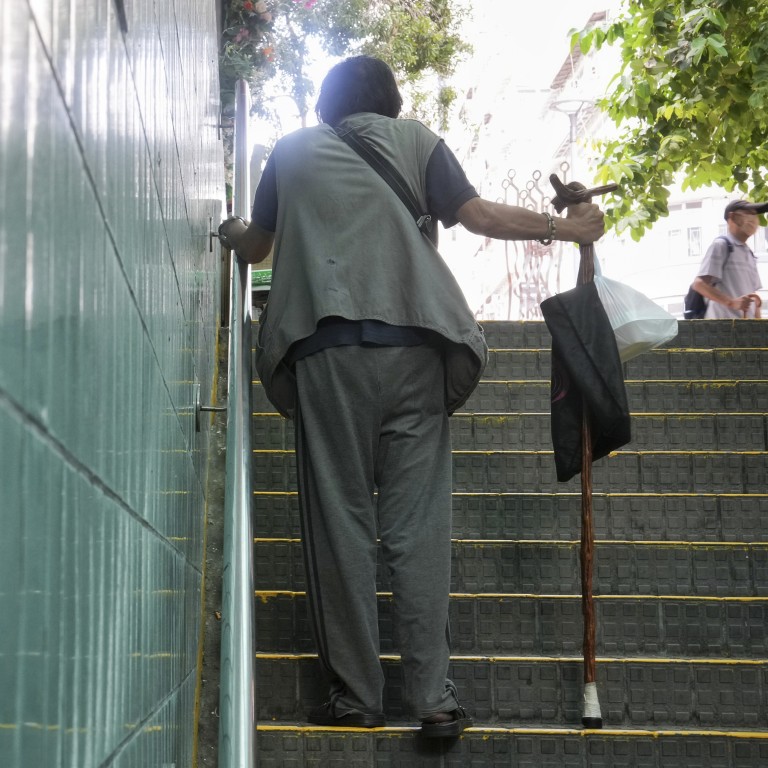
Was John Lee’s policy address all quiet on the welfare front? Hong Kong community leaders call proposals to help underprivileged ‘piecemeal’
- City leader’s policy blueprint calls for community care teams to identify carers and elderly in need of welfare services and offers cash to disabled residents holding jobs
- Community leaders, experts say raft of measures focuses on short-term handouts to meet key performance indicators, rather than offering road map for battling poverty
Hong Kong will introduce a raft of measures to support the elderly, disabled people, underprivileged children and carers, but have failed to impress some community leaders and experts, who have called the proposals piecemeal and lacking in direction.
During his policy address on Wednesday, Chief Executive John Lee Ka-chiu said authorities would task community care teams with going door-to-door to identify elderly people struggling to look after themselves and overstretched carers, and referring those in need to the relevant welfare authorities.
Starting out as a two-pronged pilot scheme in Southern district and Tsuen Wan, the initiative would launch in the first quarter of next year.
Authorities would also ask 350 care facilities to provide respite services whenever they had vacancies to allow for carers to take short breaks from their round-the-clock responsibilities.
6 key takeaways from Hong Kong leader John Lee’s policy address
However, Concern for Grassroots’ Livelihood Alliance director Sam Wong Kai-hing said the government had failed to go far enough to support the underprivileged.
“The most underprivileged groups have not yet recovered from the pandemic, but they can barely benefit directly from the policy address,” the social worker said.
“The one-off or short-term measures may be able to improve their livelihood in the short-run, but without any long-term, sustainable planning, the plight would return very soon.”
Lee’s policy blueprint also touched on poverty alleviation and announced the next round of the government’s Strive and Rise mentorship programme for underprivileged students would launch this month.
The number of students accepted under the scheme would be increased from 2,800 to 4,000. Form Four students would also be eligible to join the programme this time around, joining their peers in Forms One to Three.
In addition to helping youths plan their futures, the programme would offer study trips and exchange tours to mainland China, as well as access to an alumni network that offered social and internship opportunities, Lee said.
Good career path for Hong Kong carers for elderly ‘will make job more attractive’
Other measures announced on Wednesday included a three-year pilot project offering additional communal space to 500 families living in subdivided flats in Sham Shui Po and after-school care services for 3,000 students from low-income households.
Authorities also set their sights on encouraging people with disabilities to take up employment through a three-year pilot scheme offering HK$500 a month to those holding down a job while receiving Comprehensive Social Security Assistance.
The initiative was expected to cover about 6,800 people, and would be implemented alongside policies that increased the quota for vocational training and day-care services.
The government will look into subsidising more residential care homes on the mainland, to support elderly residents in need and interested in retiring in the Greater Bay Area.
The bay area refers to Beijing’s initiative to integrate Hong Kong, Macau and nine mainland cities into an economic powerhouse.
Advocates express concerns over checks after death of disabled Hong Kong brothers
However, Dr Au Yeung Tat-chor, an assistant professor at Lingnan University’s sociology and social policy department, said the measures “superficially touched on a wide range of topics” and lacked vision.
“The government has a strong emphasis on key performance indicators, and giving out subsidies is the easiest way to achieve short-term results and does not involve any long-term policy changes,” he said.
“But policy support is very important to encourage the employment of disabled and elderly, for example, the latter may face age discrimination at workplaces.”

Social welfare lawmaker Tik Chi-yuen said he was disappointed by this year’s policy address, arguing that it had failed to cover the “full picture”.
“There are a lot of discrete projects, like the community living rooms, but there are no [key performance indicators] on how they could eliminate poverty, and the target groups are small … I am not convinced that these could help,” he said.
“Although respite services were provided for carers, their unmet needs were far more than that, they needed financial support, as well as support from employers, but these were not addressed too.”
A burden shared: experts urge more support for Hong Kong’s tired, stressed carers
The legislator also expressed doubts that community care teams had the skills to identify carers and elderly people in need, saying the groups were voluntary and lacked professional training.
Among other proposals floated on Wednesday, Lee said the government would set up two additional support service centres, up from the previous eight, for ethnic minority groups next year, with the sites offering language and after-school tutorial classes.
Each of the centres would field a care team that would reach out to ethnic minorities households and introduce public services to those in need.

